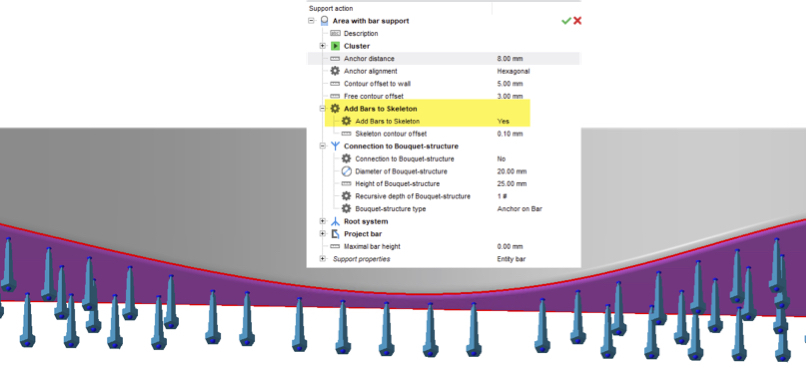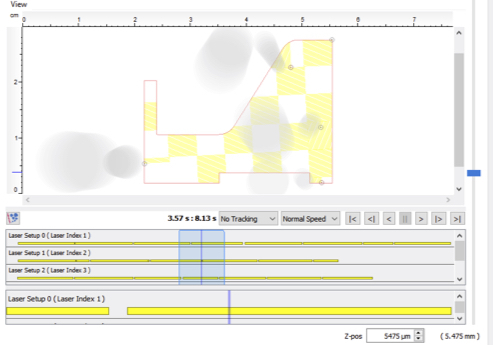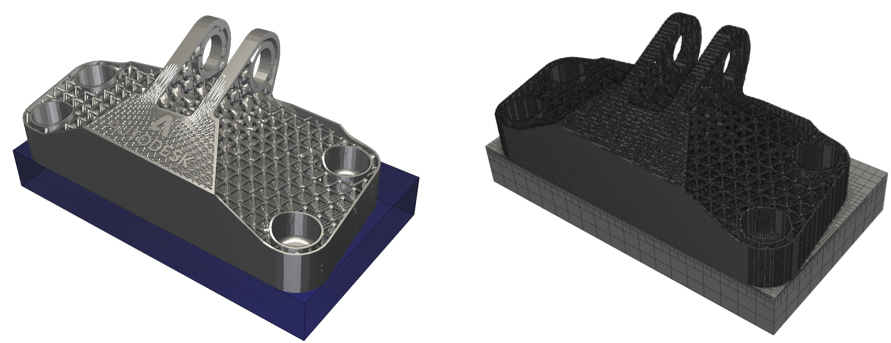Take 3D printing to a new level with the latest release of Netfabb®, 3D printing software designed to help you accomplish more work in less time with fewer build errors.
Improved printer integrations
The Netfabb 2021 release adds four new 3D printers to the built-in integration list:
• Origin One (programmable photopolymerization for mass production)
• Formlabs Form 3L (large format)
• Formlabs Fuse 1 (benchtop)
• Mimaki 3DUJ-553 (UV-curable inkjet)
View the full list of 3D printers supported HERE.
You can also expect improved integration with HP machines. Specifically, you can quickly establish print setting customizations with the ability to create, save, and load print profiles for a given material right from Netfabb. In addition, you can transfer the full build platform to HP SmartStream 3D Build Manager with a single click.

Streamlined user experiences
Netfabb 2021 includes a variety of new features and functions intended to make your day-to-day tasks simpler:
• Creating and managing support structures. Now you can clone supports between similar parts, taper polyline supports to minimize the footprint as well as the effort required to remove them. You can automatically create bar supports that recognize thin walls and generate a single path of bars, overriding the global contour offset to wall setting.

• Frequently used geometries. The Custom Part Library now be populated with your own geometries so you can have quick access to parts you use often such as custom test specimens used to fill up build platforms and common objects, such as giveaway parts.
• Arranging tools. Duplicate parts easily with the newly redesigned rectangular pattern dialogue. You can also automatically fill the build volume with selected parts and slices simultaneously, eliminating guesswork and repetitive tasks. And you can automatically select all parts inside or outside the platform, making it easier to move these parts to a different platform or delete them entirely.
• Automating common workflows. A new scripting example will allow you to compare two similar meshes automatically, and help you identify differences with colors and graphs. In addition, automatic support separation lets you separate open and solid supports into two partswith one click giving you increased control over objects when assigning toolpath parameters. The ability to clone any workspace allows for faster duplication of a build platfrom so you can experiement with different packing, slicing or toolpathing strategies easily.
Important innovations
Capping off this new release are three features to help you achieve better overall results:
1. New 3D packing methods. Two new algorithms increase packing density for processes that don’t require support structures, such as SLS and MJF. A size sorting algorithm prioritizes large parts for the center of the platform while filling the remaining volume with smaller objects, while the gravity algorithm uses a physics-based engine to simulate gravity and packs parts more closely. 2. Advanced toolpath features. New hexagonal hatch patterns help balance thermal input and build quality. Smoke simulation of slice data (from SLM Solutions and Renishaw) helps identify areas where the plume may interfere with the laser path, causing deflections that jeopardize build quality. The 2021 version also allows you to control toolpath vectors based on an external input, such as process simulation results.

3. Increased mesh limits. Simulation Utility LT (included with Netfabb Ultimate) simulates metal powder bed fusion technology to identify and remediate common build failures, including distortion, recoater blade interference, hotspots, lack of fusion zones, and support structure failure. With the 2021 version, we have relaxed the limits significantly to enable this utility to simulate even more complex geometries.

Netfabb Simulation 2021.0 highlights
Finally, look for two important new features for Netfabb Simulation. First, validated parameter files (PRM) for Inconel 718 with machine vendor defaults for the EOS M290 and the Additive Industries MetalFAB1 help you achieve accurate simulations without generating new PRM files.
Second, the ability to offset the geometry preform enables you to compensate for predicted distortion for a DED simulation and mitigate as-build distortion in DED parts.
As always, you can find more details about getting started with Netfabb here.








